人教版九年级全册靠Unit 10 You're supposed to shake hands. 核心考点讲练课件(共55张PPT)
文档属性
| 名称 | 人教版九年级全册靠Unit 10 You're supposed to shake hands. 核心考点讲练课件(共55张PPT) | 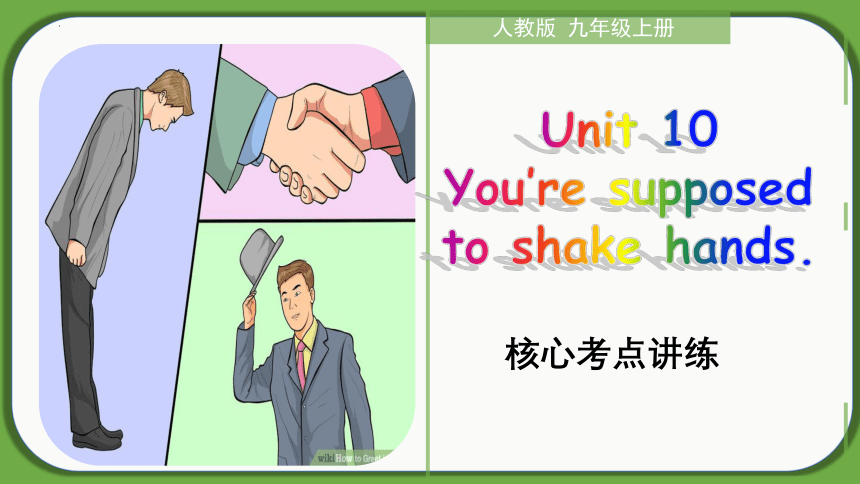 | |
| 格式 | pptx | ||
| 文件大小 | 774.2KB | ||
| 资源类型 | 教案 | ||
| 版本资源 | 人教新目标(Go for it)版 | ||
| 科目 | 英语 | ||
| 更新时间 | 2022-12-20 14:50:18 | ||
图片预览

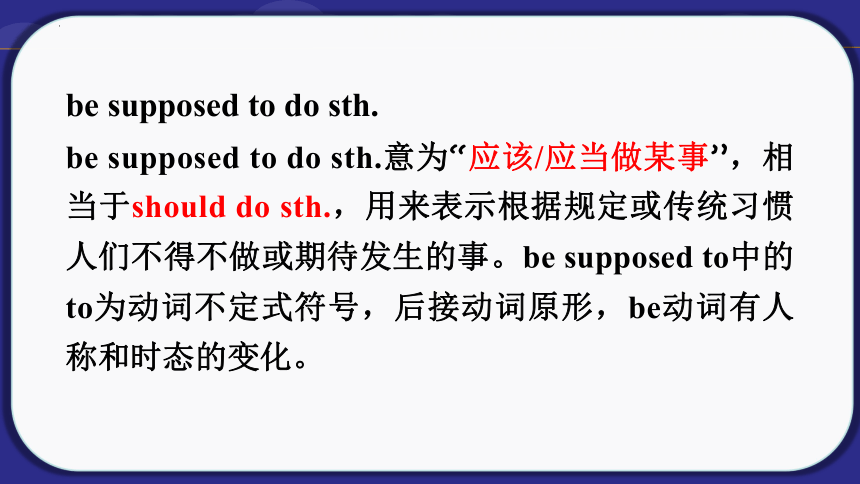
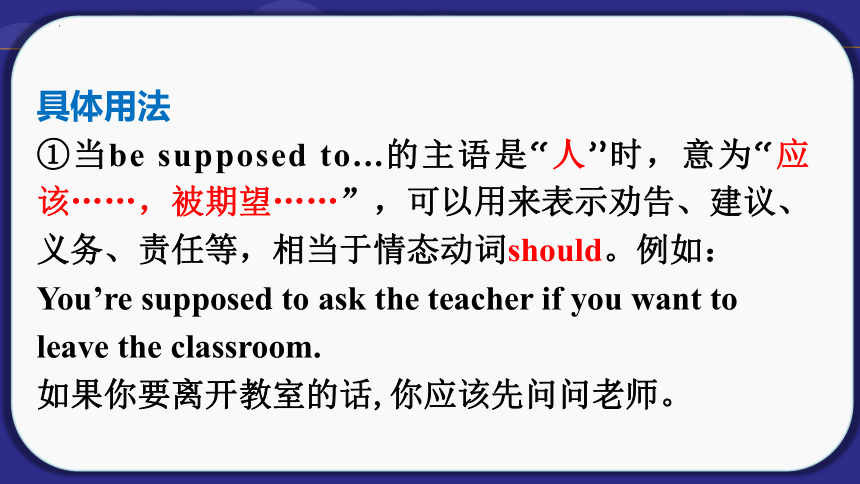
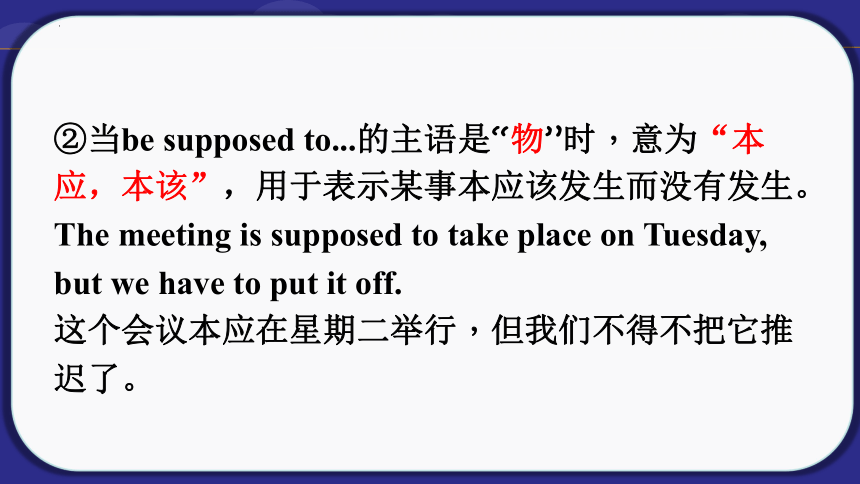
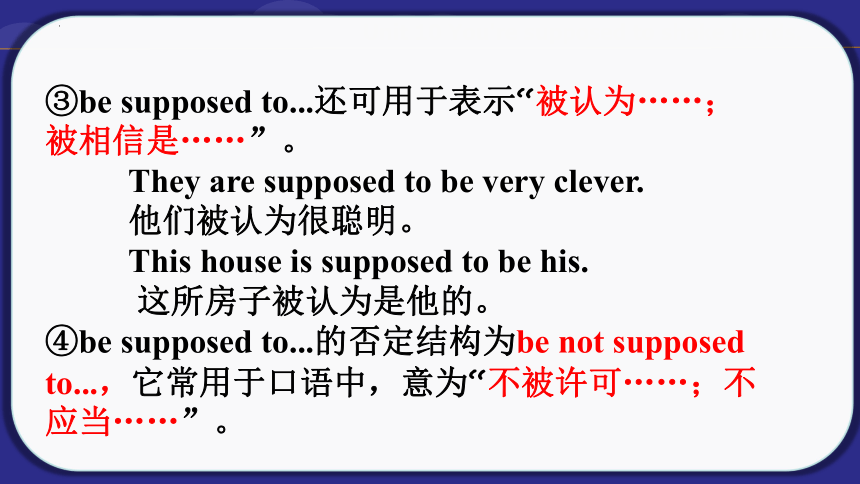

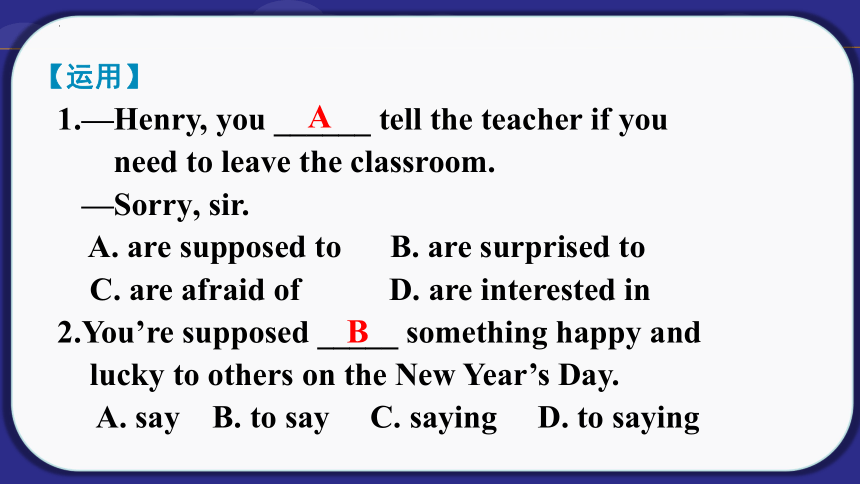

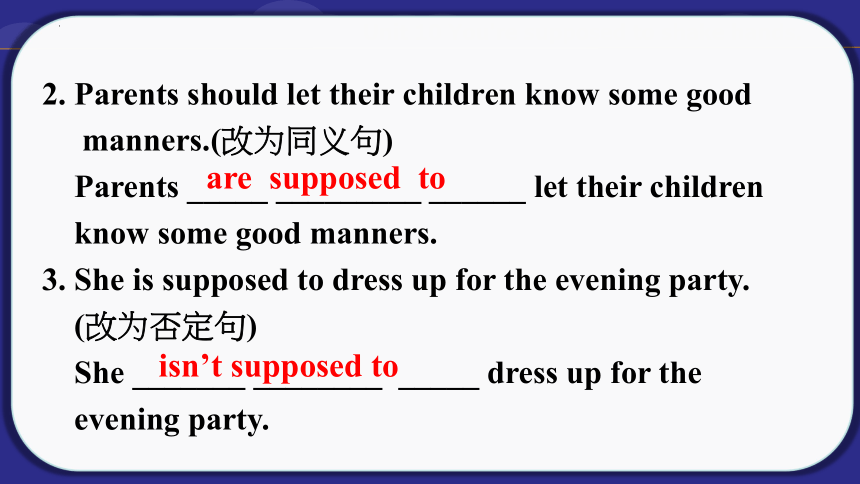
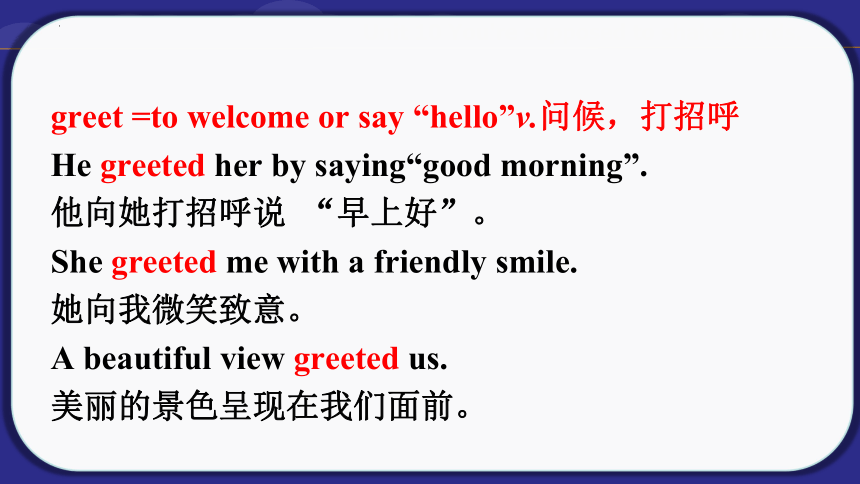
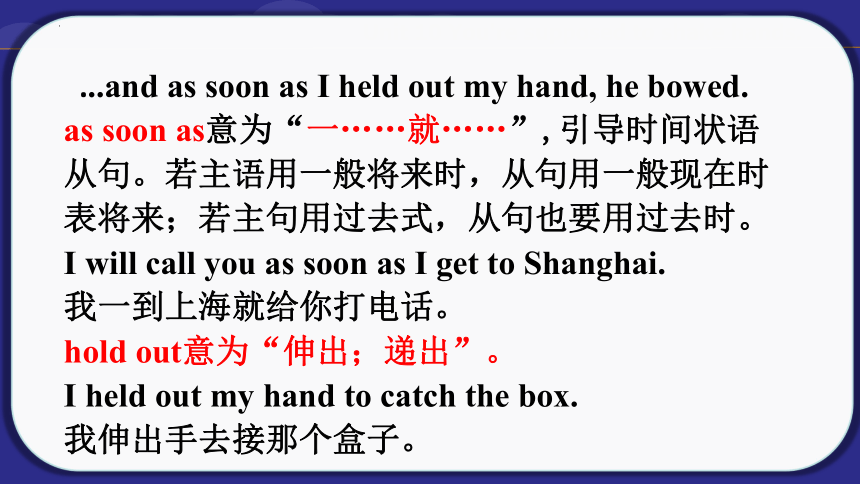
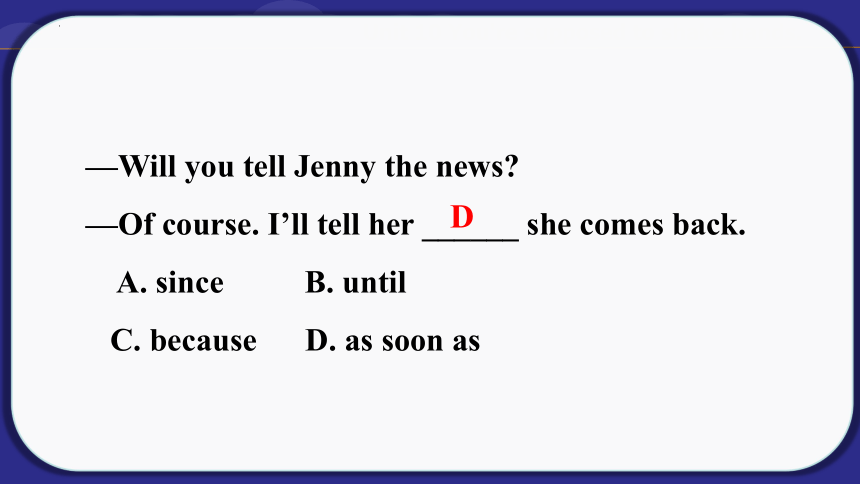
文档简介
(共55张PPT)
人教版 九年级上册
Unit 10
You’re supposed to shake hands.
核心考点讲练
be supposed to do sth.
be supposed to do sth.意为“应该/应当做某事”,相当于should do sth.,用来表示根据规定或传统习惯人们不得不做或期待发生的事。be supposed to中的to为动词不定式符号,后接动词原形,be动词有人称和时态的变化。
具体用法
①当be supposed to...的主语是“人”时,意为“应该……,被期望……”,可以用来表示劝告、建议、义务、责任等,相当于情态动词should。例如:
You’re supposed to ask the teacher if you want to leave the classroom.
如果你要离开教室的话,你应该先问问老师。
②当be supposed to...的主语是“物”时,意为“本应,本该”,用于表示某事本应该发生而没有发生。
The meeting is supposed to take place on Tuesday, but we have to put it off.
这个会议本应在星期二举行,但我们不得不把它推迟了。
③be supposed to...还可用于表示“被认为……;被相信是……”。
They are supposed to be very clever.
他们被认为很聪明。
This house is supposed to be his.
这所房子被认为是他的。
④be supposed to...的否定结构为be not supposed to...,它常用于口语中,意为“不被许可……;不应当……”。
【注意】
suppose作谓语动词后接宾语从句,变为否定句时,否定词应前移。类似的词还有think,believe等。
I don’t suppose he will tell you about it.
我认为他不会告诉你这件事。
1.—Henry, you ______ tell the teacher if you
need to leave the classroom.
—Sorry, sir.
A. are supposed to B. are surprised to
C. are afraid of D. are interested in
2.You’re supposed _____ something happy and
lucky to others on the New Year’s Day.
A. say B. to say C. saying D. to saying
A
B
【运用】
按要求完成下列句子,每空填一词。
1. I suppose he will be back in half an hour.
(改为否定句)
I _______ suppose he ______ be back in half an hour.
don’t
will
2. Parents should let their children know some good
manners.(改为同义句)
Parents _____ _________ ______ let their children
know some good manners.
3. She is supposed to dress up for the evening party.
(改为否定句)
She _______ ________ _____ dress up for the
evening party.
are supposed to
isn’t supposed to
greet =to welcome or say “hello”v.问候,打招呼
He greeted her by saying“good morning”.
他向她打招呼说 “早上好”。
She greeted me with a friendly smile.
她向我微笑致意。
A beautiful view greeted us.
美丽的景色呈现在我们面前。
...and as soon as I held out my hand, he bowed.
as soon as意为“一……就……”,引导时间状语从句。若主语用一般将来时,从句用一般现在时表将来;若主句用过去式,从句也要用过去时。
I will call you as soon as I get to Shanghai.
我一到上海就给你打电话。
hold out意为“伸出;递出”。
I held out my hand to catch the box.
我伸出手去接那个盒子。
—Will you tell Jenny the news
—Of course. I’ll tell her ______ she comes back.
A. since B. until
C. because D. as soon as
D
That’s how people in Japan are expected to greet each other.
be expected to意为“被期望;被要求”,与be supposed to同义。
e.g. She is expected to be a good doctor.
有人期望她成为一名好医生。
The visitors are expected to arrive in half an hour.
参观者要在半小时后到达。
except, except for与 besides
1. except意为“除……之外(没有)”,不包含
except后面的内容。
2. except for意为“除……之外”,用于叙述整个
情况后,在细节上加以修正或补充,含有惋惜、
美中不足之意。
3. besides意为“除……之外(还有)”,强调
besides后面的内容被包含在内。
一言辨异:
All of them went to the cinema except Tom last time. They all agreed that it was really a wonderful film except for its theme song. This time we’ll all go besides him.
上次除了汤姆以外他们都去看电影了。大家一致认为除了主题曲之外这部影片真是棒极了。这次除他去以外,我们也都去。
1. —We’re all here ________ Henry.Where’s he
—He’s gone to the library.
beside B. besides C. except D.Of
2.除了这个年轻人,他们都大动肝火。(翻译句子)
C
They all got mad except the young man.
Where I’m from, we are pretty relaxed about time.
Where I’m from是一个由where引导的地点状语从句。
e.g.Just stay where you are.就留在你原来的地方。
Where I’m from, we’re pretty relaxed about time.
在我那儿,我们对时间(的要求)相当宽松。
Language points
be relaxed about/at 意为“对……随意;对……宽松”, 后可接名词、代词或动词-ing形式。
In fact, they are relaxed about the match.
事实上, 他们对这次比赛感到很放松。
It’s necessary to learn how to relax.
学会怎样放松是必要的。
We had a very relaxing time during the vacation.
假期我们过得很放松。
【归纳拓展】 你会正确“放松”吗
词汇 词性 用 法
relax 动词 意为“放松;休息”,其现在分词形式是relaxing,过去式、过去分词形式是relaxed
relaxed 形容词 意为“放松的;宽松的;轻松自在的”, 用来修饰、说明人的情感状态
relaxing 形容词 意为“令人放松的”, 用来修饰、说明事物的特征
We can relax ourselves and feel really relaxed by taking a relaxing trip.
通过轻松的旅行, 我们可以放松自己并使自己感到真正的放松。
Their parents are relaxed about what they do at home.
他们的父母对他们在家做的事情很宽松。
1. Teresa is pretty _______ (轻松的) about time.
She thinks it is OK if you arrive late.
2. I felt ________ (relax) lying in the sun. What a
good time!
3.This is a __________ (relax) movie.
relaxed
relaxed
relaxing
So I make an effort to be on time when I meet my friends.
make an effort 做出努力
例如:你应该努力提高你的阅读能力。
You should make an effort to improve
your reading ability.
永远不要放弃。世界上从来没有人未经努力就取得成功。
Never give up. No one in the world has ever ____________ without making an __________.
succeeded
由句中助动词has可知第一个空需要用动词的过去分词构成现在完成时;make an effort表示“做出努力”。
effort
Also, we never visit a friend’s house without calling first. 而且, 我们不会事先不打电话就去朋友家的。
双重否定句
never和without 都表示否定,合在一起表达肯定意义。
例如:You will hardly ever be able to speak good English
without practicing.
不练习的话,你几乎不可能把英语说好的。
We value the time we spend with our family and friends in our everyday lives.
value 意为“重视;珍视”。 value还可以作名词,意为“价值”。
例句:Which do you value, wealth or health
你珍视哪一个,财富还是健康?
— Let’s do something for our dad.
— Good idea. We should always _____ father’s
love for us.
A. explain B. suppose C. wonder D.value
【运用】
D
We often just drop by our friends’ homes if we have time.
drop by意为“顺便拜访;随便进入”
He dropped by his friend's house when he came
back from work.
他下班回来,顺便到朋友家坐了坐。
drop by 后接某人/某地,表示“拜访某人或某地”
drop in 后接on+某人,表示“拜访某人”
后接at+某地,表示“访问某地”
【辨析】drop by 和drop in
People in Colombia needn’t make plans to meet their friends. They often just drop by them.
A. give a ride to B. give up visiting
C. forget to visit D. come over to
【运用】
D.drop by意为“顺便看望(某人)、顺便到(某处)”, 用法同come over to。
We often just walk around the town center, seeing as many of our friends as we can!
(1)seeing为现在分词短语作状语,表示主语正在进行的另一动作。
(2)as many/much as...can意为“尽可能多地”,相当于as many/much as possible。例如:
You must try to remember as many new words as you can.
你应该记住尽可能多的单词。
We’re the capital of clocks and watches, after all!
after all 意为“毕竟;终究;终归;到底”,可以位于句首,句中和句末。
After all, your birthday is only two weeks away.
毕竟,两周后就是你的生日了。
He is, after all, a child. 他毕竟还是个孩子。
— I’m afraid the boy can’t deal with the problem.
— Me too. ______, he is only 8 years old.
A. In general B. So far
C. After all D. For example
【运用】
C
be supposed to的用法
仔细观察例句,体会句式结构。
1. You are supposed to shake hands.
2. You are not supposed to eat with your hands.
3. I was supposed to arrive at 7: 00.
4. When were you supposed to arrive at the party
1. 含义及构成。
be supposed to意为“应该;被期望;理应”,用来表示根据规定人们不得不做某事或期待发生某事,时态、人称和句式的变化体现在be的变化上,to为动词不定式符号,后接动词原形。
be supposed to相当于should。
e.g. You are supposed to arrive at the meeting
at 8: 00.
=You should arrive at the meeting at 8: 00.
你应该八点到会。
2. 否定结构。
be supposed to的否定式,要在be后加not,此时相当于be not allowed to do,意为“不被许可;不应”。
3. 疑问结构。
be supposed to的疑问句式要将be的相应形式提到主语前。
用所给词的适当形式填空。
1. I think parents are__________ (suppose) to be strict
with their children.
2. In China, you are supposed__________ (shake)
hands when you meet someone for the first time.
3. You__________ (be not) supposed to park your car
here, sir.
supposed
to shake
aren’t
按要求完成下列句子。
1. You should wear smart clothes for the job interview.
(改为同义句)
You____ _________ ______wear smart clothes for
the job interview.
2. You are supposed to bow. (改为否定句)
You____ _____ _________ to bow.
are supposed to
are not supposed
3. I was supposed to call my friend an hour ago.
(对画线部分提问)
_____ ______ you__________ to do an hour ago
What were
supposed
expect v. 预料;盼望
In the United States, they’re expected to shake hands.
在美国,人们希望他们握手。
The old man is expecting his daughter’s visit.
这个老人正盼望着他女儿的到访。
Do you expect him to teach you English
你希望他教你英语吗
expect是及物动词,意为“预料,盼望”,它有以下常见用法:
expect+n. /pron. 预计……可能发生;期待某
人或某物
(2) expect+to do sth. 料想做某事
(3) expect sb. to do sth. 期望某人做某事
(4) expect +从句 预计/料想……
— You look sad. What has happened
—Everyone ______us to win the match, but we lost.
A. expects B. expected C. hopes D. hoped
B
They go out of their way to make me feel at home.
go out of one’s way 特地;格外努力
e.g. John went out of his way to make his girlfriend happy.
约翰想方设法使他的女朋友高 兴。
Language points
make sb. feel at home 使某人感到宾至如归
e.g. I’m doing everything I can to make them feel at home.
我在尽我一切所能使他们感到宾至如归。
You wouldn’t believe how quickly my French has
improved because of that.
You wouldn’t believe …是一个常用句式,相当于汉语所
说的“你无法想象……;你想都想不到……;你绝不会
相信……”,表示所陈述的事情超出想象之外。
与此类似的表达还有You would never believe…或You
would hardly believe…。
例如:
You wouldn’t believe that he found his long-lost sister in Taiwan!
你绝对想不到他在台湾找到了失散多年的姐姐!
You would never believe what quick progress he’s made ever
since he attended your class.
你根本无法想象,自从他听了您的讲课后进步有多大。
My biggest challenge is learning how to behave at the
dinner table.
learning how to behave at the table是现在分词短语,在此
用作句子的表语。再如:
His main hobby is fishing. 他的主要爱好是钓鱼。
behave
behave是不及物动词,意为“表现;行为”,behave well / badly表示“表现好/糟糕”。它的名词形式 behaviour (举止;行为),是不可数
名词。
【运用】
请根据汉语意思补全英语句子,每空一词。
(1) 如果你那样表现,你会让人厌恶的。
____ you _______ like that, you’ll get yourself disliked.
(2) 如此的行为可能招致麻烦。
_____ _________ may cause trouble.
If behave
Such behaviour
I have to say that I find it difficult to remember everything, but I’m gradually getting used to it. I don’t find French customs so strange anymore.
我不得不说,我觉得记住所有的规矩是很难的,但是我也渐渐习惯了这些,不再觉得它们奇怪了。
(1)在 I find it difficult to remember... 句中,it是形式宾 语,真正的宾语是后面的动词不定式短语 to remember everything。其句型结构为:find+ it + adj. + to do sth. 类似用法的动词还有:think, believe, know, feel等。
(2)be/get used to 意为“习惯于……”,后接名词、代词或动名词。
I find ______ important to get along well with others.
A. that B. this C. it D. them
解析:选C。本题考查it 作形式宾语的用法。句中it代替不定式短语 “to get along well with others”作形式宾语。
【运用】
Tony used to ______ to school, but he is used to ______ to school now.
A. walk; taking a bus B. walked; took a bus
C. walk; take a bus D. walk; took a bus
解析:选A。句意:Tony过去常步行去上学,但他现在习惯了乘公共汽车去上学。used to“过去经常”,后接动词原形;be used to doing sth. “习惯于做某事”。故选A。
used to 表示“过去经常”,后接动词原形。
be/get used to 表示“习惯于”,后接名词、代词或动词-ing形式。
be used to do/be used for doing 表示“用于;被用来做”, 是动词use的被动结构。
人教版 九年级上册
Unit 10
You’re supposed to shake hands.
核心考点讲练
be supposed to do sth.
be supposed to do sth.意为“应该/应当做某事”,相当于should do sth.,用来表示根据规定或传统习惯人们不得不做或期待发生的事。be supposed to中的to为动词不定式符号,后接动词原形,be动词有人称和时态的变化。
具体用法
①当be supposed to...的主语是“人”时,意为“应该……,被期望……”,可以用来表示劝告、建议、义务、责任等,相当于情态动词should。例如:
You’re supposed to ask the teacher if you want to leave the classroom.
如果你要离开教室的话,你应该先问问老师。
②当be supposed to...的主语是“物”时,意为“本应,本该”,用于表示某事本应该发生而没有发生。
The meeting is supposed to take place on Tuesday, but we have to put it off.
这个会议本应在星期二举行,但我们不得不把它推迟了。
③be supposed to...还可用于表示“被认为……;被相信是……”。
They are supposed to be very clever.
他们被认为很聪明。
This house is supposed to be his.
这所房子被认为是他的。
④be supposed to...的否定结构为be not supposed to...,它常用于口语中,意为“不被许可……;不应当……”。
【注意】
suppose作谓语动词后接宾语从句,变为否定句时,否定词应前移。类似的词还有think,believe等。
I don’t suppose he will tell you about it.
我认为他不会告诉你这件事。
1.—Henry, you ______ tell the teacher if you
need to leave the classroom.
—Sorry, sir.
A. are supposed to B. are surprised to
C. are afraid of D. are interested in
2.You’re supposed _____ something happy and
lucky to others on the New Year’s Day.
A. say B. to say C. saying D. to saying
A
B
【运用】
按要求完成下列句子,每空填一词。
1. I suppose he will be back in half an hour.
(改为否定句)
I _______ suppose he ______ be back in half an hour.
don’t
will
2. Parents should let their children know some good
manners.(改为同义句)
Parents _____ _________ ______ let their children
know some good manners.
3. She is supposed to dress up for the evening party.
(改为否定句)
She _______ ________ _____ dress up for the
evening party.
are supposed to
isn’t supposed to
greet =to welcome or say “hello”v.问候,打招呼
He greeted her by saying“good morning”.
他向她打招呼说 “早上好”。
She greeted me with a friendly smile.
她向我微笑致意。
A beautiful view greeted us.
美丽的景色呈现在我们面前。
...and as soon as I held out my hand, he bowed.
as soon as意为“一……就……”,引导时间状语从句。若主语用一般将来时,从句用一般现在时表将来;若主句用过去式,从句也要用过去时。
I will call you as soon as I get to Shanghai.
我一到上海就给你打电话。
hold out意为“伸出;递出”。
I held out my hand to catch the box.
我伸出手去接那个盒子。
—Will you tell Jenny the news
—Of course. I’ll tell her ______ she comes back.
A. since B. until
C. because D. as soon as
D
That’s how people in Japan are expected to greet each other.
be expected to意为“被期望;被要求”,与be supposed to同义。
e.g. She is expected to be a good doctor.
有人期望她成为一名好医生。
The visitors are expected to arrive in half an hour.
参观者要在半小时后到达。
except, except for与 besides
1. except意为“除……之外(没有)”,不包含
except后面的内容。
2. except for意为“除……之外”,用于叙述整个
情况后,在细节上加以修正或补充,含有惋惜、
美中不足之意。
3. besides意为“除……之外(还有)”,强调
besides后面的内容被包含在内。
一言辨异:
All of them went to the cinema except Tom last time. They all agreed that it was really a wonderful film except for its theme song. This time we’ll all go besides him.
上次除了汤姆以外他们都去看电影了。大家一致认为除了主题曲之外这部影片真是棒极了。这次除他去以外,我们也都去。
1. —We’re all here ________ Henry.Where’s he
—He’s gone to the library.
beside B. besides C. except D.Of
2.除了这个年轻人,他们都大动肝火。(翻译句子)
C
They all got mad except the young man.
Where I’m from, we are pretty relaxed about time.
Where I’m from是一个由where引导的地点状语从句。
e.g.Just stay where you are.就留在你原来的地方。
Where I’m from, we’re pretty relaxed about time.
在我那儿,我们对时间(的要求)相当宽松。
Language points
be relaxed about/at 意为“对……随意;对……宽松”, 后可接名词、代词或动词-ing形式。
In fact, they are relaxed about the match.
事实上, 他们对这次比赛感到很放松。
It’s necessary to learn how to relax.
学会怎样放松是必要的。
We had a very relaxing time during the vacation.
假期我们过得很放松。
【归纳拓展】 你会正确“放松”吗
词汇 词性 用 法
relax 动词 意为“放松;休息”,其现在分词形式是relaxing,过去式、过去分词形式是relaxed
relaxed 形容词 意为“放松的;宽松的;轻松自在的”, 用来修饰、说明人的情感状态
relaxing 形容词 意为“令人放松的”, 用来修饰、说明事物的特征
We can relax ourselves and feel really relaxed by taking a relaxing trip.
通过轻松的旅行, 我们可以放松自己并使自己感到真正的放松。
Their parents are relaxed about what they do at home.
他们的父母对他们在家做的事情很宽松。
1. Teresa is pretty _______ (轻松的) about time.
She thinks it is OK if you arrive late.
2. I felt ________ (relax) lying in the sun. What a
good time!
3.This is a __________ (relax) movie.
relaxed
relaxed
relaxing
So I make an effort to be on time when I meet my friends.
make an effort 做出努力
例如:你应该努力提高你的阅读能力。
You should make an effort to improve
your reading ability.
永远不要放弃。世界上从来没有人未经努力就取得成功。
Never give up. No one in the world has ever ____________ without making an __________.
succeeded
由句中助动词has可知第一个空需要用动词的过去分词构成现在完成时;make an effort表示“做出努力”。
effort
Also, we never visit a friend’s house without calling first. 而且, 我们不会事先不打电话就去朋友家的。
双重否定句
never和without 都表示否定,合在一起表达肯定意义。
例如:You will hardly ever be able to speak good English
without practicing.
不练习的话,你几乎不可能把英语说好的。
We value the time we spend with our family and friends in our everyday lives.
value 意为“重视;珍视”。 value还可以作名词,意为“价值”。
例句:Which do you value, wealth or health
你珍视哪一个,财富还是健康?
— Let’s do something for our dad.
— Good idea. We should always _____ father’s
love for us.
A. explain B. suppose C. wonder D.value
【运用】
D
We often just drop by our friends’ homes if we have time.
drop by意为“顺便拜访;随便进入”
He dropped by his friend's house when he came
back from work.
他下班回来,顺便到朋友家坐了坐。
drop by 后接某人/某地,表示“拜访某人或某地”
drop in 后接on+某人,表示“拜访某人”
后接at+某地,表示“访问某地”
【辨析】drop by 和drop in
People in Colombia needn’t make plans to meet their friends. They often just drop by them.
A. give a ride to B. give up visiting
C. forget to visit D. come over to
【运用】
D.drop by意为“顺便看望(某人)、顺便到(某处)”, 用法同come over to。
We often just walk around the town center, seeing as many of our friends as we can!
(1)seeing为现在分词短语作状语,表示主语正在进行的另一动作。
(2)as many/much as...can意为“尽可能多地”,相当于as many/much as possible。例如:
You must try to remember as many new words as you can.
你应该记住尽可能多的单词。
We’re the capital of clocks and watches, after all!
after all 意为“毕竟;终究;终归;到底”,可以位于句首,句中和句末。
After all, your birthday is only two weeks away.
毕竟,两周后就是你的生日了。
He is, after all, a child. 他毕竟还是个孩子。
— I’m afraid the boy can’t deal with the problem.
— Me too. ______, he is only 8 years old.
A. In general B. So far
C. After all D. For example
【运用】
C
be supposed to的用法
仔细观察例句,体会句式结构。
1. You are supposed to shake hands.
2. You are not supposed to eat with your hands.
3. I was supposed to arrive at 7: 00.
4. When were you supposed to arrive at the party
1. 含义及构成。
be supposed to意为“应该;被期望;理应”,用来表示根据规定人们不得不做某事或期待发生某事,时态、人称和句式的变化体现在be的变化上,to为动词不定式符号,后接动词原形。
be supposed to相当于should。
e.g. You are supposed to arrive at the meeting
at 8: 00.
=You should arrive at the meeting at 8: 00.
你应该八点到会。
2. 否定结构。
be supposed to的否定式,要在be后加not,此时相当于be not allowed to do,意为“不被许可;不应”。
3. 疑问结构。
be supposed to的疑问句式要将be的相应形式提到主语前。
用所给词的适当形式填空。
1. I think parents are__________ (suppose) to be strict
with their children.
2. In China, you are supposed__________ (shake)
hands when you meet someone for the first time.
3. You__________ (be not) supposed to park your car
here, sir.
supposed
to shake
aren’t
按要求完成下列句子。
1. You should wear smart clothes for the job interview.
(改为同义句)
You____ _________ ______wear smart clothes for
the job interview.
2. You are supposed to bow. (改为否定句)
You____ _____ _________ to bow.
are supposed to
are not supposed
3. I was supposed to call my friend an hour ago.
(对画线部分提问)
_____ ______ you__________ to do an hour ago
What were
supposed
expect v. 预料;盼望
In the United States, they’re expected to shake hands.
在美国,人们希望他们握手。
The old man is expecting his daughter’s visit.
这个老人正盼望着他女儿的到访。
Do you expect him to teach you English
你希望他教你英语吗
expect是及物动词,意为“预料,盼望”,它有以下常见用法:
expect+n. /pron. 预计……可能发生;期待某
人或某物
(2) expect+to do sth. 料想做某事
(3) expect sb. to do sth. 期望某人做某事
(4) expect +从句 预计/料想……
— You look sad. What has happened
—Everyone ______us to win the match, but we lost.
A. expects B. expected C. hopes D. hoped
B
They go out of their way to make me feel at home.
go out of one’s way 特地;格外努力
e.g. John went out of his way to make his girlfriend happy.
约翰想方设法使他的女朋友高 兴。
Language points
make sb. feel at home 使某人感到宾至如归
e.g. I’m doing everything I can to make them feel at home.
我在尽我一切所能使他们感到宾至如归。
You wouldn’t believe how quickly my French has
improved because of that.
You wouldn’t believe …是一个常用句式,相当于汉语所
说的“你无法想象……;你想都想不到……;你绝不会
相信……”,表示所陈述的事情超出想象之外。
与此类似的表达还有You would never believe…或You
would hardly believe…。
例如:
You wouldn’t believe that he found his long-lost sister in Taiwan!
你绝对想不到他在台湾找到了失散多年的姐姐!
You would never believe what quick progress he’s made ever
since he attended your class.
你根本无法想象,自从他听了您的讲课后进步有多大。
My biggest challenge is learning how to behave at the
dinner table.
learning how to behave at the table是现在分词短语,在此
用作句子的表语。再如:
His main hobby is fishing. 他的主要爱好是钓鱼。
behave
behave是不及物动词,意为“表现;行为”,behave well / badly表示“表现好/糟糕”。它的名词形式 behaviour (举止;行为),是不可数
名词。
【运用】
请根据汉语意思补全英语句子,每空一词。
(1) 如果你那样表现,你会让人厌恶的。
____ you _______ like that, you’ll get yourself disliked.
(2) 如此的行为可能招致麻烦。
_____ _________ may cause trouble.
If behave
Such behaviour
I have to say that I find it difficult to remember everything, but I’m gradually getting used to it. I don’t find French customs so strange anymore.
我不得不说,我觉得记住所有的规矩是很难的,但是我也渐渐习惯了这些,不再觉得它们奇怪了。
(1)在 I find it difficult to remember... 句中,it是形式宾 语,真正的宾语是后面的动词不定式短语 to remember everything。其句型结构为:find+ it + adj. + to do sth. 类似用法的动词还有:think, believe, know, feel等。
(2)be/get used to 意为“习惯于……”,后接名词、代词或动名词。
I find ______ important to get along well with others.
A. that B. this C. it D. them
解析:选C。本题考查it 作形式宾语的用法。句中it代替不定式短语 “to get along well with others”作形式宾语。
【运用】
Tony used to ______ to school, but he is used to ______ to school now.
A. walk; taking a bus B. walked; took a bus
C. walk; take a bus D. walk; took a bus
解析:选A。句意:Tony过去常步行去上学,但他现在习惯了乘公共汽车去上学。used to“过去经常”,后接动词原形;be used to doing sth. “习惯于做某事”。故选A。
used to 表示“过去经常”,后接动词原形。
be/get used to 表示“习惯于”,后接名词、代词或动词-ing形式。
be used to do/be used for doing 表示“用于;被用来做”, 是动词use的被动结构。
同课章节目录
- Unit 1 How can we become good learners.
- Section A
- Section B
- Unit 2 I think that mooncakes are delicious!
- Section A
- Section B
- Unit 3 Could you please tell me where the restroom
- Section A
- Section B
- Unit 4 I used to be afraid of the dark.
- Section A
- Section B
- Unit 5 What are the shirts made of?
- Section A
- Section B
- Review of Units 1-5
- Unit 6 When was it invented?
- Section A
- Section B
- Unit 7 Teenagers should be allowed to choose their
- Section A
- Section B
- Unit 8 It must belong to Carla.
- Section A
- Section B
- Unit 9 I like music that I can dance to.
- Section A
- Section B
- Unit 10 You're supposed to shake hands.
- Section A
- Section B
- Review of Units 6-10
- Unit 11 Sad movies make me cry.
- Section A
- Section B
- Unit 12 Life is full of the unexpected
- Section A
- Section B
- Unit 13 We're trying to save the earth!
- Section A
- Section B
- Unit 14 I remember meeting all of you in Grade 7.
- Section A
- Section B
- Review of Units 11-14
